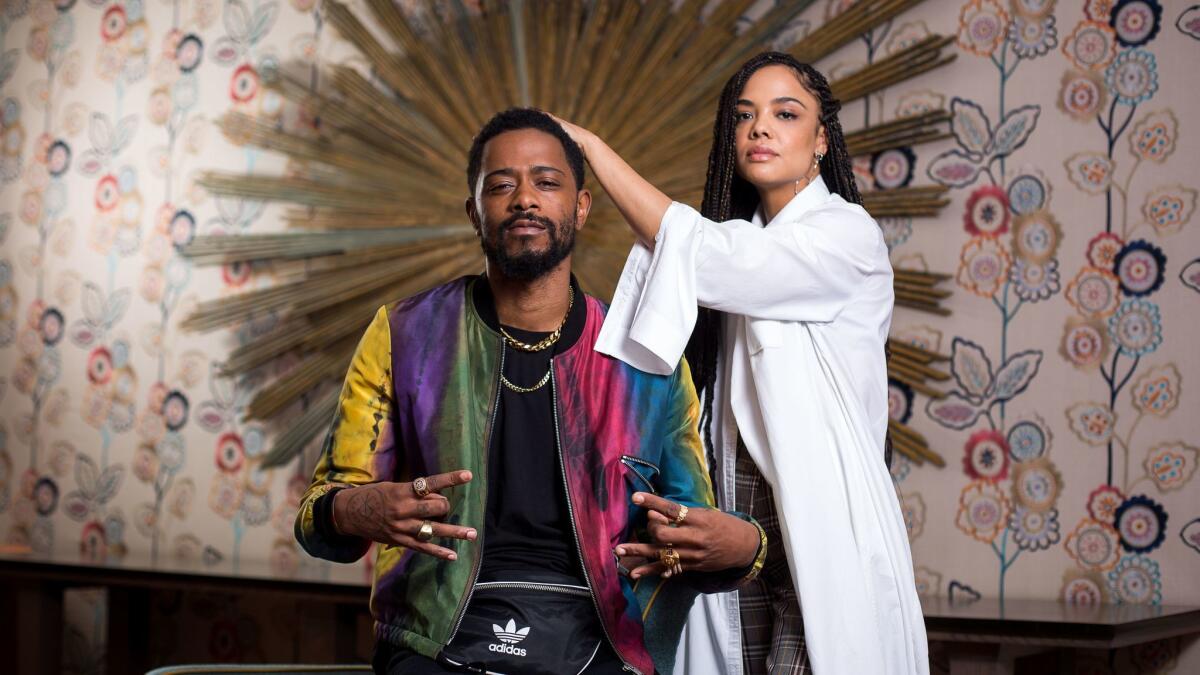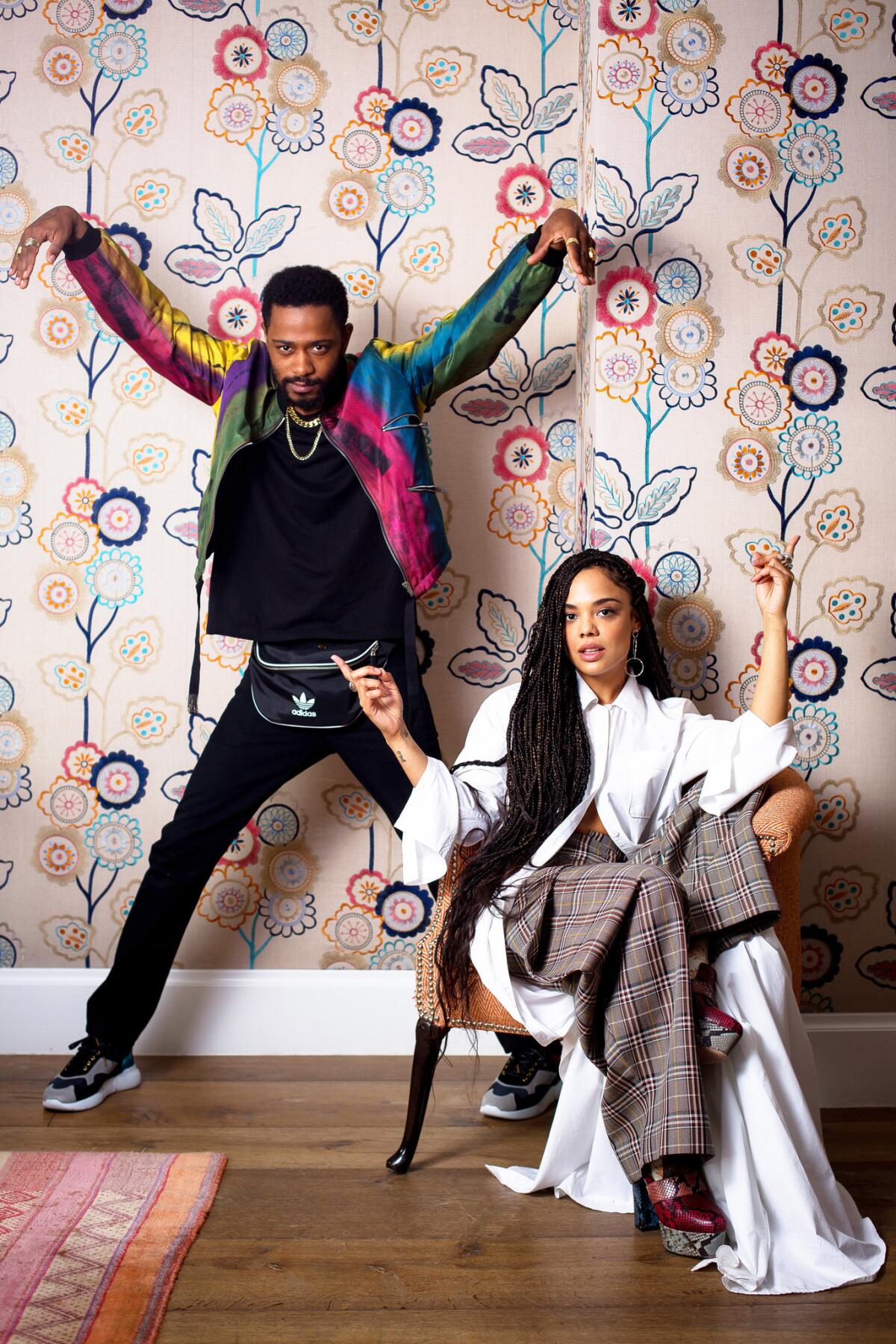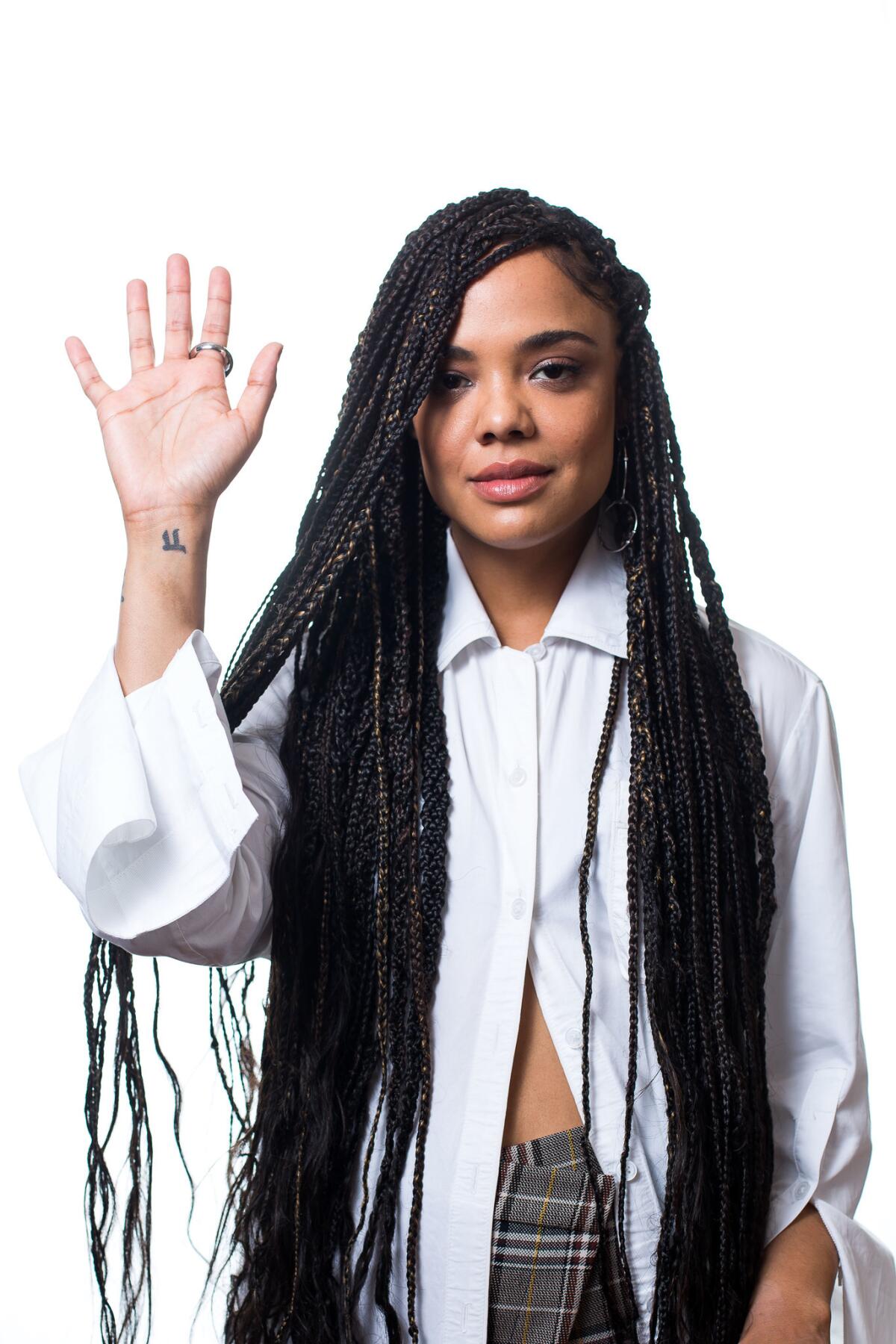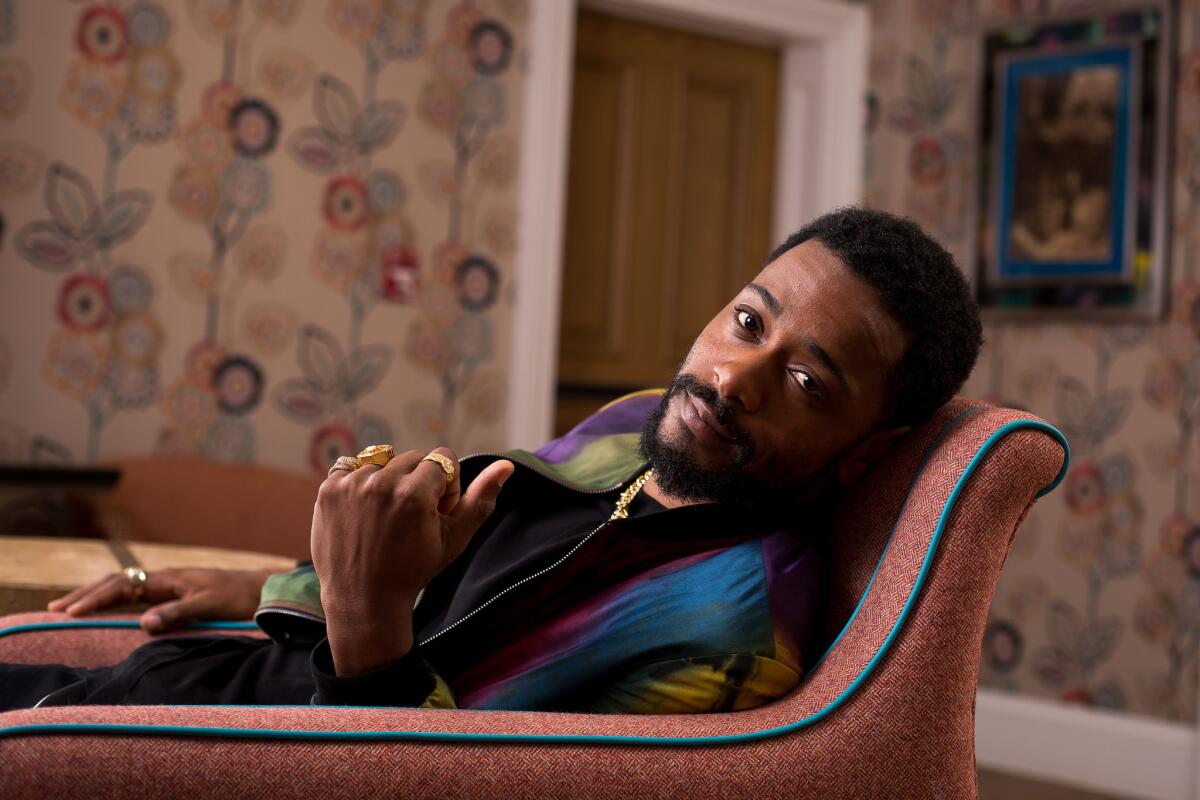Lakeith Stanfield and Tessa Thompson aren’t ‘Sorry to Bother You’ or the status quo

If it’s true that Hollywood is having a moment, one in which black creatives in front of the camera and behind the scenes are experiencing unprecedented opportunity, Tessa Thompson and Lakeith Stanfield are undoubtedly two of its biggest beneficiaries.
After all, the pair, who star in “Sorry to Bother You” in theaters July 6, have been “ones to watch” for some time. Thompson broke through in Tyler Perry’s 2010 drama “For Colored Girls,” making a strong impression amid a star-filled ensemble. Stanfield earned critical acclaim and a Film Independent Spirit award nomination opposite future Oscar winner Brie Larson in 2013’s “Short Term 12.”
But only now are they beginning to truly see the fruits of their talented labor.
“It’s like Jesus’ return,” said Stanfield of the length of time he’s been dubbed an “emerging” actor. This year, though, he’s found himself in the conversation as a possible Emmy contender, with many touting his work in Donald Glover’s FX series “Atlanta.”
“It’s great [to benefit from this moment] but there is so much more work to be done,” said Thompson, a dominant force in the just-concluded second season of HBO’s “Westworld.” “I get worried about this narrative sometimes of [being] the exceptional ones. When do we actually get to be in a space where we’re allowed mediocrity? I’m arguably, totally in my prime, but because of it, I feel such an intensity around everything being good. That’s great and I’m happy to be proud of everything. But when do you get to hit a space where you can fail in a way that’s safe?”
Hollywood’s progress, in other words, is a potential double-edged sword.
“It feels tinged,” Thompson continued. “Because I look around and everyone’s doing such great work, but it feels tenuous still. I want to get to the space where we can exhale, and it feels like we’re at some stasis.”
Until then, more films like “Sorry to Bother You” are needed to keep the advancement going.
The directorial debut of cult hip-hop icon Boots Riley follows Cassius Green (Stanfield), a young black telemarketer in Oakland who discovers a unique selling power living inside of him. That power — the ability to use a “white voice” and persuade customers to buy products -- catapults him up the ranks to the elite team inside his company, which he discovers sells heinous goods and services.
Cassius’ success raises concerns for his girlfriend, Detroit (Thompson), a sign-twirling gallery artist who is secretly part of a Banksy-style collective. The unimaginable happens when Cassius meets the company’s cocaine-snorting, orgy-hosting chief executive, Steve Lift (Armie Hammer).
Riley, who also wrote the film, serves up an intellectual rumination on capitalism, activist culture and success set in an alternative universe not unlike our own. The magically realistic dark comedy and political satire, which was acquired out of Sundance by emerging distributor Annapurna Pictures (Kathryn Bigelow’s “Detroit”), also counts Steven Yeun, Jermaine Fowler, Omari Hardwick, Terry Crews, Kate Berlant and Glover among its enviable ensemble.
While “Sorry to Bother You” is sure to drive audiences wild with its many twists and turns, that’s exactly what attracted Stanfield to the role. He knew he was in for a ride never experienced before.

It’s always been a dream of mine to...affect people and bring about change particularly for people who look like me.
— Lakeith Stanfield
“When I saw it didn’t have a cover page and kinda just started, that was weird,” Stanfield said about his first time reading the script, “because I had read so many scripts and [having a title page] was the expected format. Boots was just like ‘Boom!’ I don’t even think it said ‘interior’ or ‘exterior.’
“I thought it could be a fun adventure, but one that would give me insight into growth packets, like experiential growth in a Go-Gurt.”
“Like an applesauce of life. A Lunchable of experience,” Thompson added.
“Finger food of forwardness,” Stanfield said.
“A dollop of … yeah,” Thompson said, smiling.
She too was intrigued by Riley’s unique approach and perspective to storytelling as the frontman of the socially conscious hip-hop group the Coup since 1991. Just from reading the script, she thought about films like 2004’s “Eternal Sunshine of the Spotless Mind” and 2001’s “Amélie” that were “magical realism or had touches of it, just a skosh from reality,” she said.
“But none of them had people of color in them, so I just assumed that I wouldn’t make films like that.”
Thompson has been breaking down a lot of barriers lately, with a lauded run of impactful roles in “Creed,” “Thor: Ragnarok” and “Annihilation,” in addition to “Westworld.” She jumped at the chance to be part of “Sorry to Bother You” and to work with Stanfield who, before his “Atlanta” and “Get Out” glow up, was in Ava DuVernay’s “Selma” with her, where they shared no scenes.
Although Riley had never made a feature film before, Stanfield said he was “so glad that this was one of those projects where the person who came up with it was also the director because there was so much detail and vision woven into it.
“Sometimes it can be a lot of friction occupying lead role spaces, but he took the initiative and set the line and walked with me on it,” Stanfield said. “I felt safe and all the technical [stuff] didn’t matter.
“He wouldn’t say ‘action!’ He’d just say ‘go’ and that language spoke to me better sometimes.”

I think of all the incredibly gifted talents that came before us, that had so much to say and offer, [but] weren’t given the opportunity.
— Tessa Thompson
Thompson called it an experimental experience that was somewhat chaotic, but in the best sense of the word because “there is freedom in a certain measure of chaos.”
“Sometimes it can feel like there is some perceived ‘right way’ to do something and the director is the person that’s overseeing that right way,” she said. “But when the person at the top is admittedly [figuring it out], maybe there is a freedom in that space because there’s no person at the top … waiting on you to get there.”
Stanfield added: “And our route to getting there doesn’t necessarily matter because we all know what we’re trying to reach.”
Inspired in part by Riley’s own past as a telemarketer and community organizer, “Sorry to Bother You” is packed with social commentary and told through “a form of storytelling that’s unlike anything you’ve ingested before,” Stanfield said.
“It’s its own beast, so come and be ready for your logic to be taken on a loop and turned into a roller coaster,” he said. “Be ready to be bothered, in good ways, bad ways, in all ways.”
In some sense, that’s exactly the role Hollywood’s latest foray into inclusion and diversity plays — bothering a status quo and unsettling foundations with which the industry’s become comfortable.
“It didn’t hit me until last night, seeing all these posters, that ‘Oh, I’m the lead of this movie and this thing is going to affect people and affect people for a while,’” Stanfield said, referencing a recent screening of the film in Los Angeles where Riley was honored with Sundance’s Vanguard award.
“It’s always been a dream of mine to be able to do this line of work and affect people and bring about change particularly for people who look like me and grew up like me and had to deal with some of the things I’ve had to deal with.”

And though the progress happening in the industry “definitely isn’t something that I’m spearheading,” he said, “being part of it is a gift and I’m happy to say that, for a second, I could be part of that expression.”
“But at this cultural moment,” Thompson interrupted, addressing Stanfield, “you happen to be involved in enough of those things that it’s remarkable.”
Still, “bittersweet” is the word she uses to describe this period sometimes called a black creative renaissance. Though Thompson feels “really lucky” to have maintained a career long enough that allows her to benefit from recent inclusion conversations — “of not just what people look like on camera but diversity of thought and idea and expression,” she said — she can’t help but think of her less heralded predecessors.
“I think of all the incredibly gifted talents that came before us, that had so much to say and offer, [but] weren’t given the opportunity to,” she said. “My heart breaks around that. But also, just how much more work we have to do ...
“I guess I feel sometimes really enlivened by it and other times, that we need a nap.”
One aspect of the industry that needs more work is how black press are treated on red carpets, Stanfield added. He brought up a recent experience at an “Atlanta” Emmy consideration event.
“There were three black women at the end of the carpet,” he recalled. “I talked to all the big outlets and noticed that they were there. I didn’t really know how to react or what was going on but I felt something. Later on Twitter, one of the women who was there said that some of the smaller black outlets got overlooked.”
That woman was Stephanie Ogbogu, a digital editor with Global Grind who tweets under the handle @eleven8. Her thread described the all-too-familiar experience of black media outlets being placed at the end of carpets and often not getting the opportunity to interview talent before they’re whisked inside.
“I was like ‘Whoa!’ because I don’t really read oftentimes what publication I’m walking up to talk to,” he continued. “I’m just trying to do them so I can get off the carpet. I realized that sometimes we’re passing up these [black] outlets.
“It was profound to me and there was so much in there that I didn’t even recognize. But that’s how this continues to happen, because we’re woven into the fabric, so we don’t think about it. Now I have that in my consciousness.”
Thompson added: “And it makes sense that everyone is trying to figure out circulation and what outlets get to the most people, so there’s no mal-intent, but within it, there are systemic issues.
“When we talk about these types of stories, there has to be a premium on who gets to cover them. Because who understands them?
“That would eliminate some of the questions on the carpet,” Stanfield said, laughing, “if they had a certain understanding about certain things.”
“… There’s so much more work to be done,” Thompson said.
ALSO
Lakeith Stanfield on ‘Get Out,’ ‘Atlanta’ and working at a marijuana factory
In character with Lakeith Stanfield from “Death Note”
Natalie Portman, Gina Rodriguez, Tessa Thompson and the sci-fi sisterhood behind ‘Annihilation’
Tessa Thompson welcomed the challenges of playing a hearing-impaired musician in ‘Creed’
Get your life! Follow me on Twitter (@TrevellAnderson) or email me: [email protected].
More to Read
Only good movies
Get the Indie Focus newsletter, Mark Olsen's weekly guide to the world of cinema.
You may occasionally receive promotional content from the Los Angeles Times.











